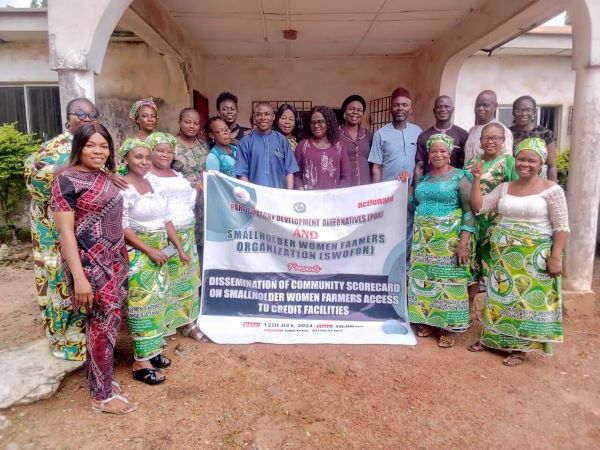Fear of the burden of repayment has been identified as a great impediment to Small scale women farmers’ willingness to access agricultural credits for food production in Ebonyi State.
This is part of issues revealed at the dissemination of a report on Community Participatory Assessment of Government Expenditure on Agriculture and the Scorecard on Smallholder Women Farmers Access to Credit Facilities in the State.
The assessment was conducted by a Nongovernmental Organisation, Participatory Development Alternatives, under the Scaling Up Public Investment in Agriculture Project supported by Actionaid-Nigeria.
The dissemination meeting was held on Friday in Abakaliki, Ebonyi State capital.

PDA’s Programme Officer, Ugochi Joseph, presenting the report on behalf of the Organisation’s Executive Chair, Dr. Mark Abani, noted that the larger percentage of Smallholder Women Farmers who participated in the assessment preferred agricultural grants to loans, insisting that the prevailing agricultural credit conditions were quite burdensome.
They, however, regretted that the grants were not always accessible to them, adding that even their cooperatives were most often not knowledgeable about the agricultural credit facilities of the Ebonyi State Government.
Joseph explained: “Seven percent of smallholder women farmers who indicated that they have received agricultural credits from the government said they received grants, hence there was no need for repayment.
“The remaining 93 percent of the respondents said that though they have not received any credit from the government, it is not easy to repay because the interest rates are too high.
“So, they would prefer grants, unless the interest rates are single digit and moratoriums given.”
Other issues identified from the assessment were non involvement of the Smallholder Women Farmers Organisation in the design, including planning, framework and implementation of government agricultural credit scheme and the cumbersome process involved in accessing government agricultural credit facilities.
The report added: “For the past four years (2020-2023), the State Ministry of Agriculture has continuously allocated funds for credit facilities in the state’s agricultural budget, yet there has never been any fund releases or expended to provide these services to smallholder farmers, especially women.”
One of the women farmers and former National Secretary, SWOFON, Nnenna Ibiam, and others who spoke appealed to the government to give more attention to specific needs of small scale women farmers in the budget, ensuring that all grants, inputs, capacity building and other forms of assistance meant for the women are given to them directly through their cooperatives.
They recommended among other things that the State Ministry of Agriculture should work in synergy with the state branch of the Small Scale Women Farmers Organisations in Nigeria and other Civil Society Organisations to be able to reach smallholder women farmers in rural communities across the state.
“We plead as the 2025 budget process will begin soon, that the Smallholder Women Farmers should be involved through the process to make inputs,” Ibiam submitted.
Government officials present at the meeting, including the HOD, Agricultural Services, Ministry of Agriculture, Chukwuma Ede; House of Assembly Committee Clerk, Ann Aghaokoro; and Director, Planning, Research and Statistics of the Assembly, Samson Egede, encouraged the women farmers not to relent in pushing for sustainable food security in the State.
Also Read:
- Nigerian military, Briech unveil first indigenous attack drones, bombs
- Edo: Okpebholo extends olive branch to Ighodalo after tribunal victory
- Ighodalo heads to Appeal Court as tribunal affirms Okpebholo’s victory
- Orchestration against Aisha Achimugu: A classical betrayal of justice, womanhood, and nationhood, by Binta Adeshola
- Governor Eno inaugurates agriculture, food security committee
They pledged to employ their various positions to further advance the dreams and aspirations of the women.
Speaking further, the Director of Statistics, State Ministry of Budget and Planning, Moses Uto, noted that the issue of food insecurity is a major problem which Governor Francis Nwifuru was set to tackle in his People’s Charter of Needs agenda.
Uto added that the Ministry would be leveraging on the Community Charter of Demands initiative to give more interest to the grassroots in the 2025 budget.


